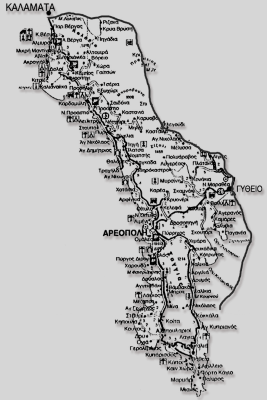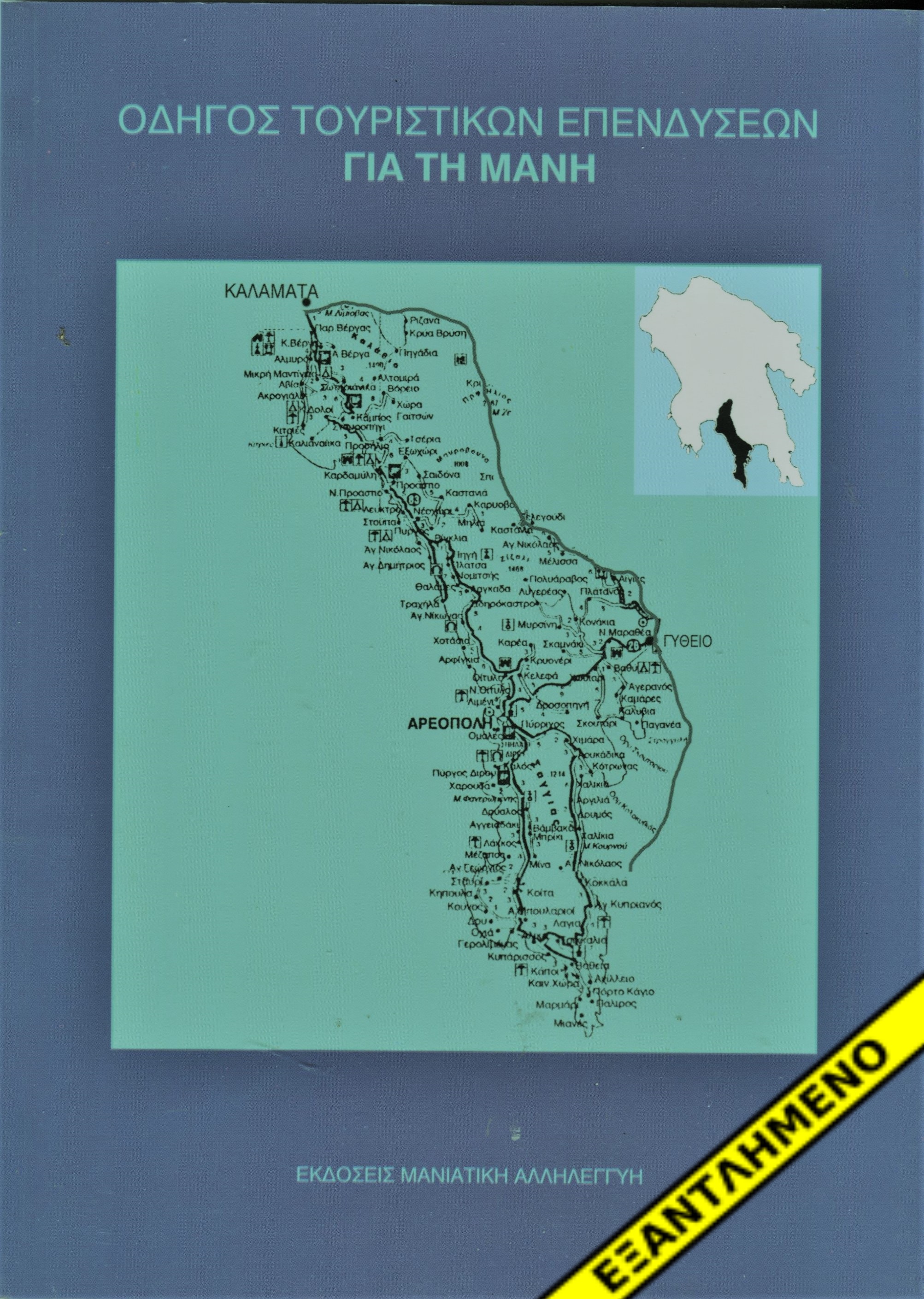ΑΠΟ ΜΗΝΑ ΣΕ ΜΗΝΑ
- Απρίλιος 2024Παλιό Πρωτοδικείο Σπάρτης: ξεκινά η μελέτη για την ανακαίνισή του! Το κτίριο αποτελεί τοπόσημο. Συνδέεται άμεσα με την εμφάνιση στην ιστορία της νέας Σπάρτης, που αποφασίστηκε κατά την περίοδο του Όθωνα κατά τη δεκαετία του 1830. … Συνέχεια ανάγνωσης Απρίλιος 2024
- Μάρτιος 2024Προγραμματισμός πτήσεων προς Αθήνα και Ηράκλειο από το αεροδρόμιο της Καλαμάτας Νέα πτήση προγραμματίζει από την 1η Ιουνίου η Aegean-Olympic Air που θα συνδέει το Ηράκλειο με την Καλαμάτα δυο φορές την εβδομάδα. Εξ` άλλου οι … Συνέχεια ανάγνωσης Μάρτιος 2024
- ΦΕΒΡΟΥΑΡΙΟΣ 2024Προγραμματική σύμβαση για έκδοση άδειας το υδατοδρόμιου στο Γύθειο Στις 28 Δεκεμβρίου 2023 υπεγράφη προγραμματική σύμβαση μεταξύ του Δήμου Ανατολικής Μάνης, του Δημοτικού Λιμενικού Ταμείου, της Περιφέρειας Πελοποννήσου και του Περιφερειακού Ταμείου Ανάπτυξης για τη χρηματοδότηση … Συνέχεια ανάγνωσης ΦΕΒΡΟΥΑΡΙΟΣ 2024
- ΙΑΝΟΥΑΡΙΟΣ 2024Ολοκληρώθηκαν οι χερσαίες εγκαταστάσεις του υδατοδρομίου Καλαμάτας από την εταιρία Hellenic Seaplanes: Άρχισε η κατασκευή των χερσαίων εγκαταστάσεων του υδατοδρομίου Καλαμάτας και συγκεκριμένα η τοποθέτηση του σταθμού επιβατών στο μεσσηνιακό λιμάνι από την εταιρία Hellenic Seaplanes … Συνέχεια ανάγνωσης ΙΑΝΟΥΑΡΙΟΣ 2024
- Δεκέμβριος 2023Με μεγάλη συμμετοχή η 18η Γιορτή Κάστανου στην Άρνα. Τριήμερες ήταν και φετινές εκδηλώσεις «Γιορτή του Κάστανου» στην Άρνα της Λακωνίας, το χωριό που βρίσκεται στα υψίπεδα της ανατολικής πλευράς του Κεντρικού Ταϋγέτου. Άρχισαν την Παρασκευή … Συνέχεια ανάγνωσης Δεκέμβριος 2023
ΕΠΙΧΕΙΡΗΜΑΤΙΚΗ ΔΡΑΣΤΗΡΙΟΤΗΤΑ
- ΚΑΦΕΝΕΙΟ «το KAFENIO»
στον οικισμό Αγίου Δημητρίου της Δημοτικής Κοινότητας Αγίου Νικολάου Δυτικής Μάνης
Μέσα στις αλλαγές που διαμορφώθηκαν τα τελευταία χρόνια και καθόρισαν τη φυσιογνωμία της νεότερης Ελλάδας σε όλα τα επίπεδα, μόνο τα πανέμορφα χωριουδάκια της ελληνικής υπαίθρου βάσταξαν και συνεχίζουν να μας χαρίζουν την αυθεντική ελληνική ομορφιά συνδέοντάς μας με το παρελθόν, εναρμονισμένο με τη σύ γχρονη πραγματικότητα.
Πριν μερικούς μήνες άρχισε να λειτουργεί στο οικισμό Αγίου Δημητρίου ένα καφενείο «το KAFENENIO» που μας θυμίζει την αίγλη των παλιών καφενείων. Προσπαθεί να διατηρήσει, με σεβασμό στο παρελθόν, το χρώμα, τις μνήμες και το ύφος των καφενείων των παλιών εποχών ως τόπο συνάντησης ανταλλαγής απόψεων των ντόπιων κατοίκων, πίνοντας ένα ελληνικό ( ή ευρωπαϊκό) καφέ, ένα ποτό, απολαμβάνοντας ένα ιδιαίτερο πρωινό ή χειροποίητα γλυκά πολλαπλών γεύσεων.
Οι διαχειρίστριες του καταστήματος προσπαθούν με τις ενέργειές τους να δώσουν την ευκαιρία στους νέους, αλλά και στους αλλοδαπούς, που τις επισκέπτονται, να θαυμάσουν κάτι από τη γοητεία του παρελθόντος με την παλιά ζεστασιά της ελληνικής καθημερινότητας σε χώρους οικείους και απλούς, πιστεύοντας και ότι τα παλιά καφενεία συνεχίζουν να υπάρχουν και μαζί τους να υπάρχει η γοητεία της παλιάς γειτονιάς.
Αντώνης Ρουμανέας
MAIN ARTICLE IN ENGLISH
- THE LAYOUT OF OUR NEWSPAPER
PRACTICAL EXPRESSION OF OUR IDEOLOGICAL FRAMEWORK
In the main article of a previous issue of “Maniot Solidarity”, we presented the ideological framework that defines our newspaper, its objectives and aspirations for Mani, as condensed in its title. We deem it appropriate, as a follow-up, to specify how our ideological framework is promoted through research and, ultimately, through the selection and layout of content on specific pages of our newspaper. The greatest difficulty in the research process is information overload, which ultimately becomes a problem because, in addition to preventing the readers from approaching the substance of the material selected for publication, it also hinders them from critically selecting the most useful elements to improve their intellectual orientation and ideological background. Through this information overload, we attempt to document issues related to the ideological orientation and goals of our newspaper, and subsequently to clear them from any kind of bias in presentation and influencing opinions, so that we can delve into their true essence.
We have designed the layout of content in such a way as to refer to the entire chronological spectrum of Mani from the beginning to modern day. We attempt to harmoniously relate historical events of the past to the current needs of our area and its future prospects. We attempt to keep the layout of our material the same for every issue. More specifically, this layout is presented below:
On page 2, aspects of the heroic past of our region are presented, from the emergence of the geographical term “Mani” to our time. The search for content is difficult, since the needed material is scattered in many publications, most of which has not yet been digitised. In order to write the articles presented, on-site visits to libraries in Athens are required, as it is in the Greek capital where the sources are located. Given the strong differentiation of the historical course of the individual regions of Mani (Inner Mani, Outer Mani, Lower Mani, Bardounia, as initially presented by the first Maniot scholar Nikitas Nifakis, and other smaller geographical divisions), we considered it appropriate to collect and present this information on page 10.
Having thoroughly understood Adamantios Korais’[1] view that the educational upgrade of the Greeks should precede the Revolution of 1821 (concern that was surpassed by the impetuosity created by the desire for freedom of the Greek people), and believing in the need for continuous effort and improvement in the educational sector, we have reserved page 3 for the publication of articles on education and culture. Having accepted the anxiety for the rise of the cultural level in Mani, as expressed by Nikitas Nifakis due to his impending death (1818), we have decided to permanently place his “Farewell Address” quatrain on the top right-hand corner of page 3, as a timeless message to the youth of Mani.
Historians do not agree on who produces historical events: peoples, or individuals? We are not in a position to take sides for or against either view. However, we consider it our duty, besides the intense promotion of achievements by Maniots as a whole to publish on page 4 the permanent column Ονομάτων Επίσκεψις, which presents the life and works of personalities from the intellectual and scientific worlds who excelled in their respective fields of activity.
In pages 6 and 7, we publish topics concerning the development of our region, mainly the technical studies and public works necessary to support the explosive increase in private investments in our area in recent decades. In these articles, we attempt to clear the news from the deliberately exaggerated projections of micro-political expediency. Politicians usually promote these projects through multiple references to the same work during its evolutionary phase; we attempt to disconnect the absorption of credits from the efficiency of the project as it really appears on the ground, and we do not avoid referring to the negative consequences on the final result caused by recapitulative tables and price revisions.
News from modern life in Mani is featured on pages 1, page 9 and page 8 with the presentation of local business activities (Επιχειρηματικές Δραστηριότητες) and on pages 11 and 12 with the presentation of Αnnouncements – Births, Marriages, Obituaries – (Κοινωνικά Γεγονότα).
The main article on page 1 reflects the general ideological framework of our association “Maniot Solidarity” for our region, as it relates to current political and social events. The translation of the main article into English and the presentation of the translation on page 8 is our conscientious obligation to the second and third generation Maniots, who might have difficulties with written Greek, as well as to foreign philo-Maniots. In a similar context, the signed articles presented on page 5, and often also on page 12, which, starting from critical socio-political events, also affect our area.
The layout of our newspaper, apart from the desire to meet the expectations of the contemporary Maniots and philo-Maniots, aims to create a legacy for future generations. We believe that our attempt to portray the character of the region in a coherent way can also function like seeds that condense the characteristics of plants for future germination.
THE EDITORIAL BOARD
[1] Greek scholar and humanist (1748-1833)







